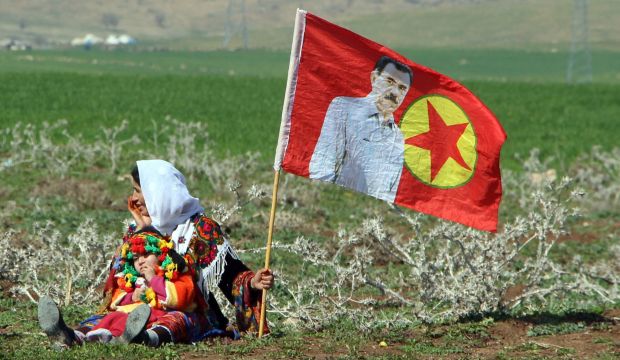
A Turkish Kurdish woman with a child sits next to a Kurdistan Workers’ Party flag with a picture of the imprisoned Kurdish rebel leader Abdullah Ocalan in Silopi, Turkey, on March 2, 2015. (Reuters/Kadir Baris)
Diyarbakir, Turkey, Reuters—Jailed Kurdish rebel leader Abdullah Öcalan called on Saturday for his militant group to hold a congress on ending a three-decade insurgency against the Turkish state but stopped short of declaring an immediate halt to its armed struggle.
“This struggle of our 40-year-old movement, which has been filled with pain, has not gone to waste but at the same time has become unsustainable,” Öcalan said in the message read out by two Kurdish politicians at a rally to mark the Kurdish “Newroz” New Year celebrations.
Tens of thousands of Kurds gathered in the southeastern city of Diyarbakir to hear the message from the Kurdistan Workers’ Party (PKK) leader Öcalan.
President Recep Tayyip Erdoğan, then prime minister, launched talks with Öcalan in late 2012 to end an insurgency that has killed 40,000 people, ravaged the region’s economy and tarnished Turkey’s image abroad. Progress has been faltering since then, but Kurdish faith in Öcalan remains undiminished.
“History and our people are demanding from us a democratic solution and peace in line with the spirit of the age,” he said, calling for a PKK congress to determine its “political and social strategy in harmony with the spirit of the new period.”
Young men in green guerrilla outfits and women in brightly coloured dresses danced as patriotic Kurdish songs played over a sound system. Organizers claimed a million people attended, but there were no official figures from local authorities.
Large screens each side of a stage showed Öcalan’s face while many in the crowd waved the flags of his militant group, deemed a terrorist organization by Ankara, the United States and the European Union.
The mere display of Kurdish insignia, let alone an image of Öcalan, could have brought arrest and imprisonment less than a decade ago.
“We’re celebrating now but we’ve suffered thousands of martyrs, massacres, mystery killings, destroyed villages,” said Ekrem Baran, 50, among the crowd.
“We support the peace process and expect the Kurdish people to bring peace. They are the hope of the Middle East,” he said.
At the same event two years ago, Öcalan, jailed since 1999 on an island near Istanbul, declared a ceasefire and said in a written declaration it was “time for guns to fall silent and for politics to be spoken.”
His fighters began withdrawing to Iraq two months later under a deal envisaging increased rights for Kurds, who make up around 20 percent of Turkey’s 78 million population.
The PKK halted the withdrawal in September 2013, blaming government footdragging.
The ceasefire has largely held but distrust runs deep, exacerbated by the perception among Kurds in Turkey that Ankara has done too little to support their brethren fighting against Islamic State of Iraq and Syria (ISIS) militants in neighboring Syria.
Tensions are also running high ahead of a June parliamentary election.
The leader of the pro-Kurdish Peoples’ Democratic Party (HDP), Selahattin Demirtaş, this week dismissed speculation over “dirty bargaining” with the ruling Justice and Development Party (AKP) over the process, rejecting the notion his party would support Erdoğan’s goal of a powerful executive presidency in return for Kurdish rights.
The PKK took up arms to carve out an independent Kurdish homeland in the southeast in 1984. Their now scaled-back demands include autonomy for local governments, Kurdish-language education and the overhaul of security-related laws.
